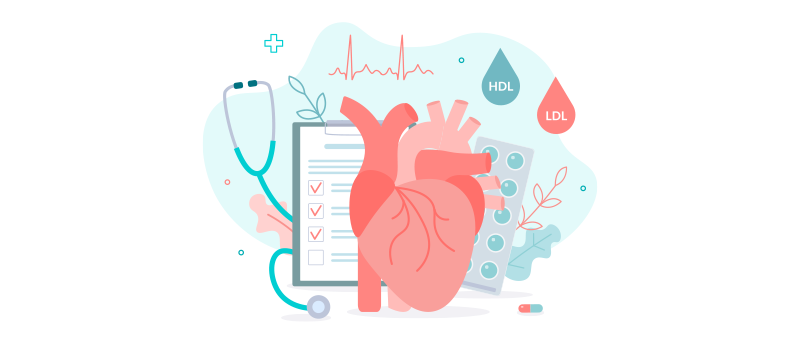What’s the Buzz
The Bee Healthy Blog
What Are the Long-Term Side Effects of Heartburn Medication?

Most people have experienced occasional acid reflux and heartburn, for example, after a fatty or spicy meal. Burning lower chest pain symptoms occur due to increased acid production and stomach acid back-flowing into the esophagus (food pipe from the throat to the stomach). Over-the-counter medications such as Tums and Rolaids can usually provide heartburn relief in most cases. However, it is estimated that approximately 1 in 5 Americans suffers from gastroesophageal reflux disease (GERD), a type of chronic acid reflux in which gastric acid and other stomach contents persistently flow back into the esophagus.
People with GERD can take medications to decrease acid production. However, is it safe to take these drugs long-term? Please continue reading to learn about some long-term side effects of proton pump inhibitors (PPIs) and other medications used to treat gastroesophageal reflux disease or severe heartburn.
What medications are used to treat gastroesophageal reflux disease (GERD)?
Lifestyle changes and antacids can help relieve symptoms in most people with mild acid reflux. However, if the symptoms of GERD are severe, persistent, and do not respond to lifestyle modifications, two types of medications can be used to treat the condition—H2 blockers (H2 receptor antagonists) and proton pump inhibitors (PPIs). Both types of drugs work by reducing the amount of acid produced in the stomach.
H2 receptor antagonists are usually the first-choice treatment for patients with mild GERD symptoms. Examples include famotidine (Pepcid AC), cimetidine (Tagamet), and nizatidine (Axid AR). H2 blockers are available as over-the-counter products or with a prescription.
Proton pump inhibitors are used to treat more severe symptoms, including patients with esophagitis (inflammation of the esophagus) seen on endoscopic examination. Examples of PPIs include pantoprazole (Protonix), omeprazole (Prilosec), esomeprazole (Nexium), lansoprazole (Prevacid), dexlansoprazole (Dexilant), and rabeprazole (Aciphex). Some PPIs are over-the-counter products, while others will require prescriptions.
Can you take acid reflux medicine every day?
Frequent heartburn or GERD (occurring more than twice a week) usually responds best to a heartburn medicine such as a proton pump inhibitor taken every day as directed rather than as needed at the onset of heartburn symptoms.
However, most over-the-counter treatments for heartburn are not meant to be taken every day for a long time. Prescription proton pump inhibitors are generally given for short-term use (4-8 weeks) to help control acid reflux and stomach ulcers.
How does taking antacids affect you long-term?
Over-the-counter antacids typically contain calcium or aluminum. Long-term use of calcium-containing antacids such as Rolaids and Tums can lead to high blood calcium levels, especially if you also take calcium supplementation. Though rare, chronic use of these calcium-containing antacids can lead to kidney stones and kidney failure. On the other hand, Mylanta and Maalox are antacids with aluminum as one of the active ingredients. Long-term use of aluminum-containing antacids can lead to changes in calcium absorption and an increased risk of bone fracture (osteoporosis).
You should consult a healthcare provider before taking antacids for more than two weeks. Rarely, a serious health condition such as stomach cancer may present with common symptoms like indigestion and burning pain in the lower chest. Heartburn symptoms can also be confused with symptoms of a heart attack. It is important to be properly evaluated by a healthcare provider to get to the root cause of your symptoms.
What are the long-term effects of taking acid reducers like proton pump inhibitors?
Prolonged use of an over-the-counter proton pump inhibitor beyond the recommended course of treatment or without a doctor’s supervision can be dangerous. Similarly, misusing or overusing prescription heartburn medications can have serious health consequences. Some of the health concerns associated with long-term proton pump inhibitor use include:
Hypergastrinemia
This is a rebound increase in stomach acid production after stopping PPI therapy. This can occur after long-term PPI use or after taking PPIs for as little as 8 weeks. Hypergastrinemia may increase the risk of gastric cancer.
Pneumonia
Medications for GERD decrease acid formation in the stomach, and stomach acidity is important in defending against certain bacteria we ingest. This can lead to an overgrowth of bacteria called Helicobacter pylori which can potentially be aspirated into the lungs and cause pneumonia.
Clostridium difficile-associated diarrhea
Similar to the link between PPIs and the increased risk of pneumonia, gastric acid normally protects against Clostridium difficile, a virulent bacteria that can cause severe gastrointestinal illness. When proton pump inhibitors are taken for the long term, they lead to a reduced pH in the stomach, allowing C. difficile to grow out of control.
Bone fractures
Long-term PPI users can be at an increased risk of wrist, hip, and spine fractures due to reduced calcium absorption.
Hypomagnesemia
Rarely proton pump inhibitors can lead to life-threatening hypomagnesemia (low magnesium levels) with symptoms such as muscle weakness, cramps, low blood pressure, convulsions, and heart arrhythmias. This risk is higher in long-term use and older adults.
Vitamin deficiencies
Long-term use of PPIs can lead to adverse effects such as vitamin B12 deficiency due to poor absorption of the vitamin. The risk is especially high in elderly patients.
Acute interstitial nephritis
In a small number of people, a hypersensitivity reaction (allergic reaction) to PPIs can lead to acute interstitial nephritis (a type of kidney injury). This can occur within a few days of starting treatment or up to 18 months after. After discontinuation of the PPI, the kidney injury typically resolves on its own.
Subacute cutaneous lupus erythematosus
This is a drug-induced reaction of PPIs in which skin lesions develop on sun-exposed areas of the body. It can occur within a week or up to 4 years after starting PPI treatment. This is a lupus-like syndrome that typically goes away after stopping the medication.
Drug interactions
Medications used to prevent reflux can have interactions with other drugs. By reducing acid production, PPIs increase the pH levels in the stomach, which can affect the absorption of certain medications.
What is the safest long-term heartburn medication?
Untreated GERD can lead to damaged tissue at the lower end of the esophagus, which puts you at risk of severe symptoms like difficulty swallowing and serious conditions like esophageal cancer.
Proton pump inhibitors are generally considered safe and effective for both initial treatment and maintenance treatment of heartburn and GERD. However, many patients experiencing GERD overuse or misuse of PPIs believe they are completely safe.
The truth is that OTC and prescription PPIs can cause serious damage and are potential risks when used for the long term without the supervision of a healthcare professional. Certain people, such as the elderly, are at even greater risk of the complications of heartburn medication with everyday use for the long term.
To reduce your risk of the long-term side effects of heartburn medication, always talk to a doctor before taking over-the-counter medications for more than 2 weeks. Never take prescription heartburn medicines at higher doses or for a longer time than advised by your doctor.
References:












SOCIAL